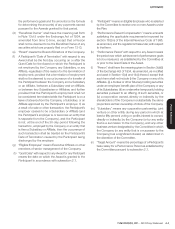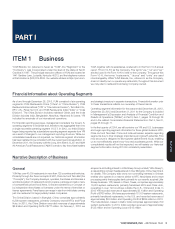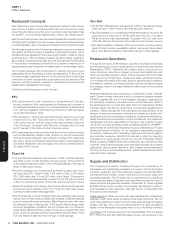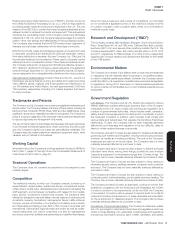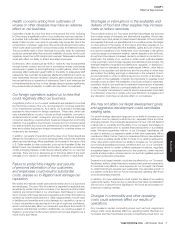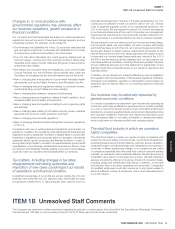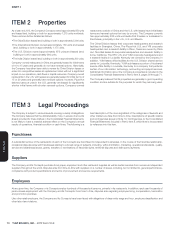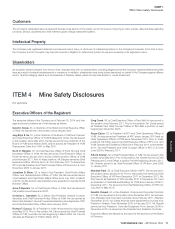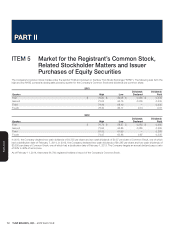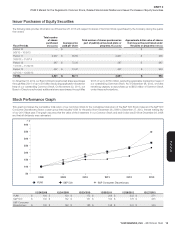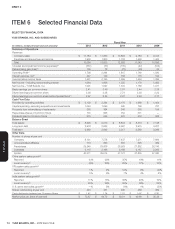Pizza Hut 2013 Annual Report Download - page 103
Download and view the complete annual report
Please find page 103 of the 2013 Pizza Hut annual report below. You can navigate through the pages in the report by either clicking on the pages listed below, or by using the keyword search tool below to find specific information within the annual report.
YUM! BRANDS, INC.-2013 Form10-K 7
Form 10-K
PART I
ITEM 1ARisk Factors
Health concerns arising from outbreaks of
viruses or other diseases may have an adverse
effect on our business.
Outbreaks of avian flu occur from time to time around the world, including
in China where a significant portion of our profits and revenues originate. It
is possible that outbreaks in China and elsewhere could reach pandemic
levels. Public concern over avian flu generally may cause fear about the
consumption of chicken, eggs and other products derived from poultry,
which could cause customers to consume less poultry and related products�
This would likely result in lower revenues and profits. Avian flu outbreaks
could also adversely affect the price and availability of poultry, which could
negatively impact our profit margins and revenues. Widespread outbreaks
could also affect our ability to attract and retain employees.
Furthermore, other viruses such as H1N1 or “swine flu” may be transmitted
through human contact, and the risk of contracting viruses could cause
employees or guests to avoid gathering in public places, which could
adversely affect restaurant guest traffic or the ability to adequately staff
restaurants. We could also be adversely affected if jurisdictions in which we
have restaurants impose mandatory closures, seek voluntary closures or
impose restrictions on operations of restaurants. Even if such measures are
not implemented and a virus or other disease does not spread significantly,
the perceived risk of infection or health risk may affect our business.
Our foreign operations subject us to risks that
could negatively affect our business.
A significant portion of our Concepts’ restaurants are operated in countries
and territories outside of the U.S., and we intend to continue expansion
of our international operations. As a result, our business is increasingly
exposed to risks inherent in foreign operations. These risks, which can
vary substantially by country, include political instability, corruption,
social and ethnic unrest, changes in economic conditions (including
consumer spending, unemployment levels and wage and commodity
inflation), the regulatory environment, income and non-income based
tax rates and laws and consumer preferences as well as changes in the
laws and policies that govern foreign investment in countries where our
restaurants are operated�
In addition, our results of operations and the value of our foreign assets are
affected by fluctuations in currency exchange rates, which may adversely
affect reported earnings� More specifically, an increase in the value of the
U.S. Dollar relative to other currencies, such as the Australian Dollar, the
British Pound, the Canadian Dollar and the Euro, as well as currencies in
certain emerging markets, could have an adverse effect on our reported
earnings. There can be no assurance as to the future effect of any such
changes on our results of operations, financial condition or cash flows.
Failure to protect the integrity and security
of personal information of our customers
and employees could result in substantial
costs, expose us to litigation and damage our
reputation.
We receive and maintain certain personal information about our customers
and employees. The use of this information is regulated by applicable law,
as well as by certain third-party contracts. If our security and information
systems are compromised or our employees, franchisees or vendors
fail to comply with these laws and regulations and this information is
obtained by unauthorized persons or used inappropriately, it could result
in liabilities and penalties and could damage our reputation, cause us
to incur substantial costs and result in a loss of customer confidence,
which could adversely affect our restaurant operations and results of
operations and financial condition. Additionally, we could be subject to
litigation, government enforcement actions and private litigation as a
result of any such failure.
Shortages or interruptions in the availability and
delivery of food and other supplies may increase
costs or reduce revenues.
The products sold by our Concepts and their franchisees are sourced
from a wide variety of domestic and international suppliers. We are also
dependent upon third parties to make frequent deliveries of food products
and supplies that meet our specifications at competitive prices. Shortages
or interruptions in the supply of food items and other supplies to our
restaurants could adversely affect the availability, quality and cost of itemswe
buy and the operations of our restaurants. Such shortages or disruptions
could be caused by inclement weather, natural disasters such as floods,
drought and hurricanes, increased demand, problems in production or
distribution, the inability of our vendors to obtain credit, political instability
in the countries in which foreign suppliers and distributors are located, the
financial instability of suppliers and distributors, suppliers’ or distributors’
failure to meet our standards, product quality issues, inflation, other factors
relating to the suppliers and distributors and the countries in which they
are located, food safety warnings or advisories or the prospect of such
pronouncements or other conditions beyond our control. A shortage or
interruption in the availability of certain food products or supplies could
increase costs and limit the availability of products critical to restaurant
operations, which in turn could lead to restaurant closures and/or a decrease
in sales. In addition, failure by a principal distributor for our Concepts and/
or our Concepts’ franchisees to meet its service requirements could lead
to a disruption of service or supply until a new distributor is engaged, and
any disruption could have an adverse effect on our business.
We may not attain our target development goals,
and aggressive development could cannibalize
existing sales.
Our growth strategy depends in large part on our ability to increase our net
restaurant count in markets outside the U.S., especially China and other
emerging markets. The successful development of new units will depend
in large part on our ability and the ability of our Concepts’ franchisees to
open new restaurants and to operate these restaurants on a profitable
basis. We cannot guarantee that we, or our Concepts’ franchisees, will
be able to achieve our expansion goals or that new restaurants will be
operated profitably. Further, there is no assurance that any new restaurant
will produce operating results similar to those of our existing restaurants.
Other risks which could impact our ability to increase our net restaurant
count include prevailing economic conditions and our, or our Concepts’
franchisees’ ability to obtain suitable restaurant locations, negotiate
acceptable lease or purchase terms for the locations, obtain required
permits and approvals in a timely manner, hire and train qualified personnel
and meet construction schedules.
Expansion into target markets could also be affected by our Concepts’
franchisees’ ability to obtain financing to construct and open new restaurants.
If it becomes more difficult or more expensive for our Concepts’ franchisees
to obtain financing to develop new restaurants, the expected growth of
our system could slow and our future revenues and operating cash flows
could be adversely impacted.
In addition, the new restaurants could impact the sales of our existing
restaurants nearby. There can be no assurance that sales cannibalization
will not occur or become more significant in the future as we increase our
presence in existing markets.
Changes in commodity and other operating
costs could adversely affect our results of
operations.
Any increase in certain commodity prices, such as food, supply and
energy costs, could adversely affect our operating results. Because our
Concepts and their franchisees provide competitively priced food, our


